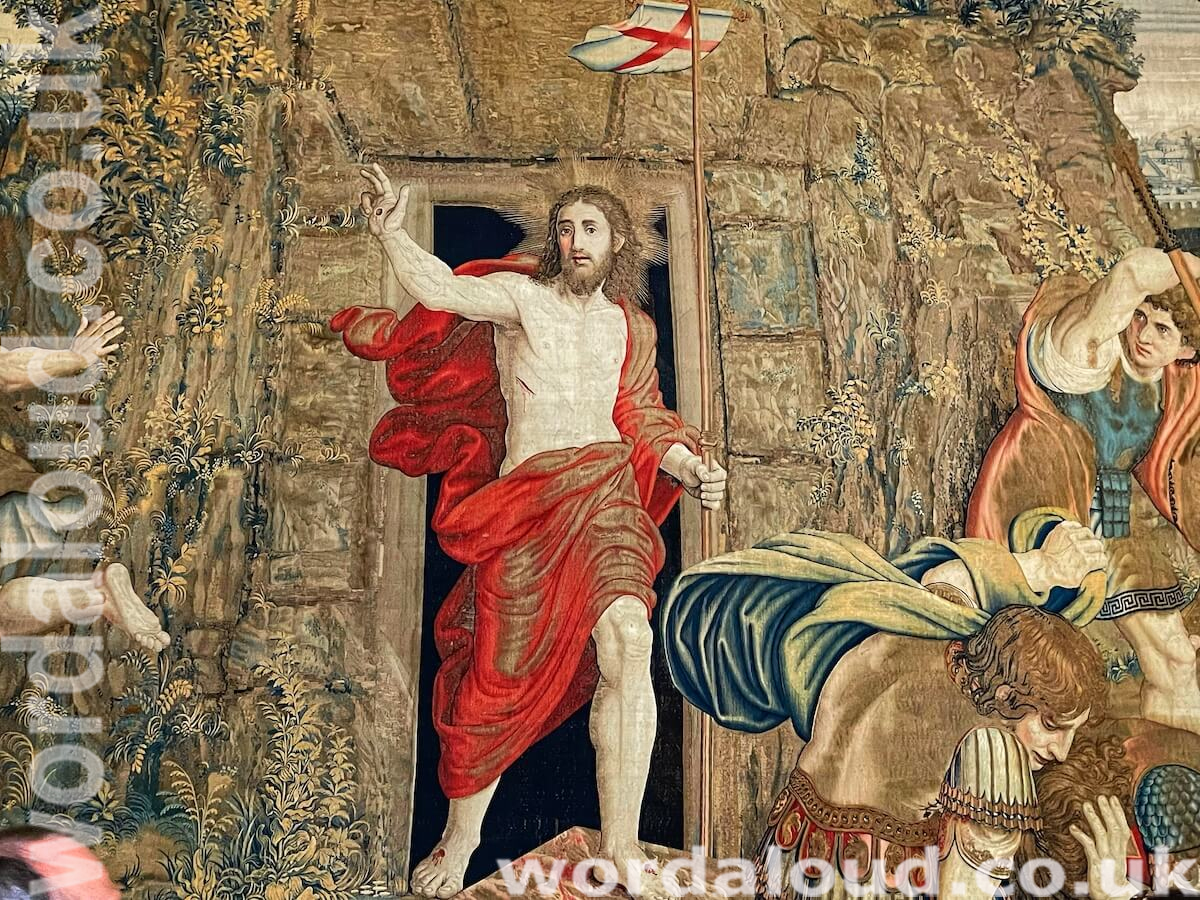Christian Art | Prayer With Jesus | Psalms | God’s Eternity And Human Frailty | King David As A Boy | Audio KJV | Love Revealed By Jesus Christ | King James Audio Bible
Psalm 90 | King James Audio Bible
YouTube | KJV | King James Version | Psalm 90 | Audio Bible | Word Aloud
Psalm 90 meditates on brevity of human existence juxtaposed against the eternal nature of God. Psalm 90 invites readers to ponder the fragility of life while seeking solace in the enduring and transcendent character of God.
The psalm begins with affirmation: ‘Lord, thou hast been our dwelling place in all generations.’ This opening sets the tone for a contemplative journey, acknowledging the Lord as a timeless refuge for generations past and those to come. Moses, traditionally attributed as the author, draws upon spiritual insight, expressing a profound awareness of God’s enduring presence throughout the ages.
Imagery employed in the psalm invokes the timeless act of creation. ‘Before the mountains were brought forth, or ever thou hadst formed the earth and the world, even from everlasting to everlasting, thou art God.’ This cosmic perspective places finite existence of humanity in stark contrast to the eternal and unchanging nature of God. The psalmist expresses God who existed before the foundations of the earth were laid, emphasizing the divine as the constant amidst the transient.
The psalm expresses ephemeral nature of human life. ‘Thou turnest man to destruction; and sayest, Return, ye children of men.’ The psalmist describes impermanence of life, likening it to a fleeting dream or a watch in the night. Imagery of a flood sweeping humanity away and the metaphor of grass flourishing in the morning only to wither in the evening captures a brevity of our mortal journey.
The psalmist recognizes fragility of human existence as subject to the consequences of divine anger and wrath. ‘For we are consumed by thine anger, and by thy wrath are we troubled.’ This acknowledgment reflects an acute awareness of the human condition, marked by our susceptibility to consequences of sin and divine justice.
A theological reflection is embedded in recognition of God’s omniscience. ‘Thou hast set our iniquities before thee, our secret sins in the light of thy countenance.’ The psalmist acknowledges that nothing is hidden from God, and the recognition of our sins is illuminated in the light of God’s presence.
Amidst this contemplation of life’s brevity and consequences of human frailty, the psalmist introduces a plea for divine instruction: ‘So teach us to number our days, that we may apply our hearts unto wisdom.’ This prayer reflects a desire for a profound understanding of the temporality of life, coupled with the wisdom to live in a manner that aligns with God’s eternal purposes.
The psalm takes a turn with an appeal for divine compassion and a fervent plea for God’s favour. ‘Return, O Lord, how long? and let it repent thee concerning thy servants.’ The psalmist implores God to relent from judgment, seeking instead the satisfaction of divine mercy. This petition expresses human yearning for the grace and benevolence of God.
In closing verses, the psalmist pleas for divine favour in a poignant request: ‘Let thy work appear unto thy servants, and thy glory unto their children.’ There is longing for manifestation of God’s redemptive work and display of His glory throughout the generations.
The psalm concludes with benediction, expressing a deep desire for the beauty of the Lord to rest upon the worshippers and a plea for divine affirmation: ‘And let the beauty of the Lord our God be upon us: and establish thou the work of our hands upon us; yea, the work of our hands establish thou it.’

Psalm 90 | King James Audio Bible KJV | Love Revealed By Jesus Christ
Lord, thou hast been our dwelling place in all generations.
Before the mountains were brought forth, or ever thou hadst formed the earth and the world, even from everlasting to everlasting, thou art God.
Thou turnest man to destruction; and sayest, Return, ye children of men.
For a thousand years in thy sight are but as yesterday when it is past, and as a watch in the night.
Thou carriest them away as with a flood; they are as a sleep: in the morning they are like grass which groweth up.
In the morning it flourisheth, and groweth up; in the evening it is cut down, and withereth.
For we are consumed by thine anger, and by thy wrath are we troubled.
Thou hast set our iniquities before thee, our secret sins in the light of thy countenance.
For all our days are passed away in thy wrath: we spend our years as a tale that is told.
The days of our years are threescore years and ten; and if by reason of strength they be fourscore years, yet is their strength labour and sorrow; for it is soon cut off, and we fly away.
Who knoweth the power of thine anger? even according to thy fear, so is thy wrath.
So teach us to number our days, that we may apply our hearts unto wisdom.
Return, O Lord, how long? and let it repent thee concerning thy servants.
O satisfy us early with thy mercy; that we may rejoice and be glad all our days.
Make us glad according to the days wherein thou hast afflicted us, and the years wherein we have seen evil.
Let thy work appear unto thy servants, and thy glory unto their children.
And let the beauty of the Lord our God be upon us: and establish thou the work of our hands upon us; yea, the work of our hands establish thou it.
Psalm 90 | King James Audio Bible KJV | Love Revealed By Jesus Christ
- Eternal Nature Of God: The psalm emphasizes timeless and unchanging nature of God, portraying God as the eternal refuge for all generations.
- Creation And Transcendence: Imagery related to the creation of the earth and the world highlights God’s transcendent position before the foundations of the earth were laid.
- Brevity Of Human Life: Psalm 90 poignantly explores fleeting nature of human existence, using metaphors such as a watch in the night, a flood sweeping humanity away, and grass that withers.
- Consequences Of Sin: The psalmist acknowledges the consequences of human frailty, recognizing impact of divine anger and wrath due to sin.
- Omniscience Of God: The psalm reflects on God’s omniscience, acknowledging that nothing is hidden from God’s gaze, and our sins are laid bare in the light of God’s countenance.
- Prayer For Wisdom: There is a plea for divine instruction, a desire to ‘number our days’ and gain wisdom to live in alignment with God’s eternal purposes.
- Divine Compassion And Mercy: The psalm includes fervent appeals for God’s compassion and mercy, with prayers for God to relent from judgment and satisfy God’s servants with early mercy.
- Longing For Divine Favour: The psalmist expresses a deep yearning for the manifestation of God’s redemptive work and the display of God’s glory, both for the worshippers and future generations.
- Human Yearning For God’s Grace: The closing verses contain a plea for the beauty of the Lord to rest upon the worshippers, underscoring timeless human yearning for divine grace and affirmation.
- Temporal Reflection And Eternal Purpose: Psalm 90 invites contemplation on the temporality of life, urging individuals to confront the brevity of their existence while finding purpose and guidance in God’s eternal nature.








